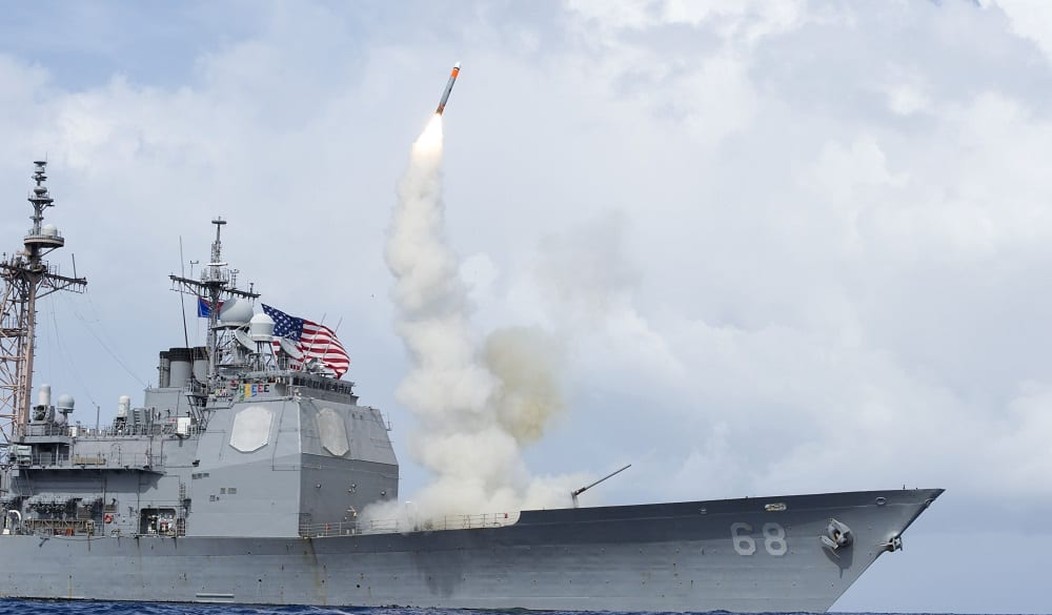Three days ago the administration seemed to have tamped down the mess in Syria and Iraq enough that it could focus on the burgeoning geopolitical threat represented by North Korea and the ties it has with Communist China. Then Khan Sheikhoun was hit by what is looking like a chemical attack that combined both chlorine gas and sarin nerve agent. Unlike the hundred or so chemical attacks carried out in Syria since Obama drew his red line and took away all of Syria’s chemical weapons, this one was spectacularly successful. We don’t know the casualty count but it will be north of 100 dead and wounded, mostly women and children.
Yesterday there were two separate but coordinated events which hint that this attack will result in an American military response. I would say allied response but damned few of our allies are capable of doing more that holding our coats in most fights.
The question members of this Council must ask themselves is this: If we are not able to enforce resolutions preventing the use of chemical weapons, what does that say for our chances of ending the broader conflict in Syria? What does that say of our ability to bring relief to the Syrian people? If we are not able to enforce resolutions preventing the use of chemical weapons, what does that say about our effectiveness in this institution?
…
I began my remarks by saying that in the life of the United Nations, there are times when we are compelled to take collective action. I will now add this: When the United Nations consistently fails in its duty to act collectively, there are times in the life of states that we are compelled to take our own action.
Donald Trump at the press conference with King Abdullah:
Yesterday, a chemical attack — a chemical attack that was so horrific, in Syria, against innocent people, including women, small children, and even beautiful little babies. Their deaths was an affront to humanity. These heinous actions by the Assad regime cannot be tolerate.
…
Q Before I move on to the King, could I just quickly ask you if the chemical attack crosses a red line for you?PRESIDENT TRUMP: It crossed a lot of lines for me. When you kill innocent children, innocent babies — babies, little babies — with a chemical gas that is so lethal — people were shocked to hear what gas it was — that crosses many, many lines, beyond a red line. Many, many lines.
“What Assad did is terrible. What happened in Syria is truly one of the egregious crimes and it shouldn’t have happened. And it shouldn’t be allowed to happen,” the president said.
Asked what specific steps he might take, Trump replied: “I don’t want to say what I’m going to be doing with respect to Syria.”
Secretary of Defense Mattis yesterday:
“It was a heinous act and will be treated as such,” Mr. Mattis told reporters Wednesday before a meeting with Singaporean Defense Minister Ng Eng Hen at the Pentagon.
— Josh Kraushaar (@HotlineJosh) April 6, 2017
Secretary of State Rex Tillerson today:
Mr Tillerson said there was “no doubt” that the Assad regime was responsible for the attack, which he described as a “serious matter” that required a “serious response”. The New York Times and Washington Post reported that the Pentagon was considering options for a possible military strike on Syria in response to the attack.
“With the acts that he [Mr Assad] has taken, it would seem that there would be no role for him to govern the Syrian people,” Mr Tillerson said. “The process by which Assad would leave is something that I think requires an international community effort.”
Asked whether the US would organise an international coalition to pave the way for the removal of Mr Assad from power, he said: “Those steps are under way.”
Here I’d note that UNSC Resolution 2118, which was passed in the aftermath of a chemical attack in 2013 contemplates removing Assad from power, so the tool for his removal is already in place.
We also know Tillerson talked to his Russian counterpart yesterday.
Defense Secretary James Mattis will brief President Donald Trump on Thursday at Mar-a-Lago on military options against Syrian leader Bashar al-Assad’s regime in the wake of a deadly attack which activists said killed at least 100 people — including 25 children — and injured 400 others earlier this week.
The White House and Pentagon have had detailed back-and-forth conversations over the past two days about options, including a National Security Council meeting Wednesday. Mattis and National Security Adviser H.R. McMaster have had repeated contact about the best way forward in Syria, a U.S. official told NBC News.
I’m afraid all signs point to yes.
The question then becomes the scope and the intent of the attack. The administration seems to have moved its rhetoric from a punitive attack to punish the regime and destroy known stocks of chemical weapons to outright regime change. I don’t know how we get from here to there. And if we don’t get there, it is going to cause problems downstream. The executive orders forbidding assassination (EO 12333 signed by Ronald Reagan remains valid) seems to put a decapitation strike against Assad off limits and I don’t see the friendly army waiting in the wings to march into Damascus. Killing Assad and replacing him with one of his close associates or an Iranian stooge doesn’t seem to be a step forward even if it, like killing Qaddafi, temporarily makes us feel good.













Join the conversation as a VIP Member